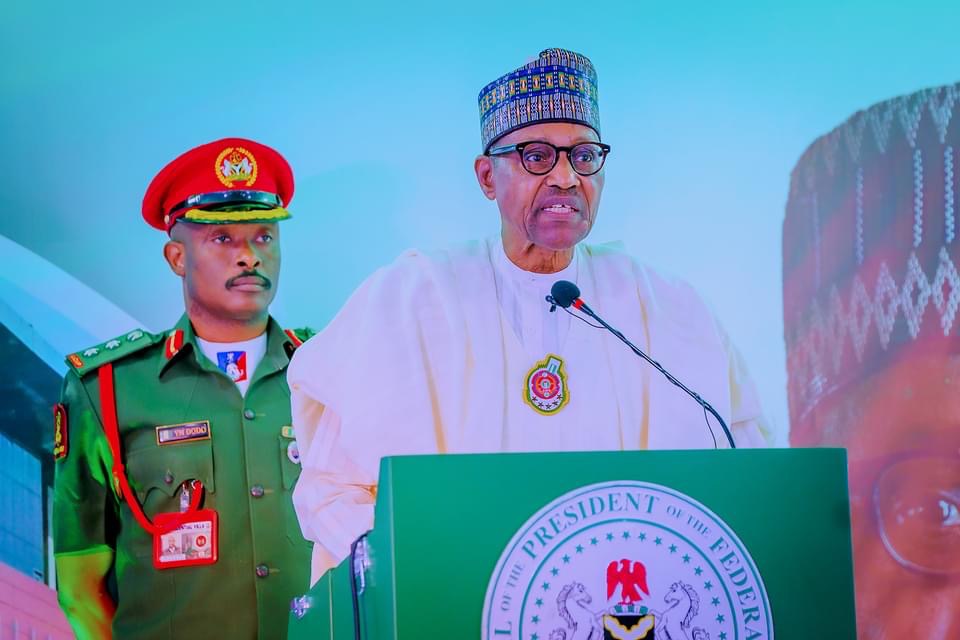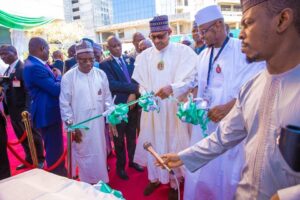

President Muhammadu Buhari has hailed the contributions of the digital economy in driving growth, creating employment, and generating revenue for the country, saying auctioning of the 5G spectrum has generated $547 million.
Buhari said this while commissioning the National Shared Services Centre, a one-stop-shop for Ministries, Departments and Agencies (MDAs) to interface with citizens, in Abuja on Tuesday.
According to a statement issued on Tuesday by his spokesman, Femi Adesina, the President said the National Shared Services Centre, which also houses a Cybersecurity Operations Centre, Network Centre and Call Centre, will provide services that are “swift, secure and seamless”.
President Buhari noted that the Information, Communication and Technology Sector (ICT) had accelerated diversification of the economy and Q2 Gross Domestic Product Report by the National Bureau of Statistics showed the extent of growth, with the ICT contributing an unprecedented 18.44 per cent to the GDP, close to three times the 6.33 per cent contribution of the oil sector in the same quarter.

“As part of our efforts to expand our digital infrastructure, we increased our 4G base stations from 13,823 to 36,751 from August 2019 to date, and this has increased the percentage of 4G coverage across the country from 23 percent to 77.52 percent, also from August 2019 to date. We have also followed this up with roll-out of 5G services.
“It is noteworthy that the digital economy sector has excelled in generating revenue for the government. In particular, at the Ministerial Retreat that I chaired from the 18th to 19th of October 2022, our independent analysts adjudged the digital economy sector to have generated 594 percent of its revenue target from the 2019 baseline. This is very commendable. As part of these unprecedented achievements, the sector generated over $547 million dollars from the auctioning of the 5G spectrum alone,” he said.
Buhari stated that he was pleased to unveil and commission a number of initiatives that further express the government’s commitment to developing a sustainable digital economy in Nigeria.
READ ALSO: UK unveils banknotes featuring King Charles III
President Buhari that the digital economy ensured continuity in governance during the restrictions that came into force as a result of the COVID-19 pandemic.
“We approved the National Policy on Virtual Engagements for Federal Public Institutions on the 14th of October 2020 and this enabled us to formalize government online meetings. As such, statutory meetings like the Federal Executive Council meetings, Council of State meetings, and other meetings can now take place online, effectively, and legally.
“Our administration’s commitment to promoting data promotion and privacy is receiving praise across the world and we have increased our digital identity enrolments from 39 million in October 2020 to about 92 million today.
“The massive increase of about 63 million in about two years is a global success story and has led to several requests for partnership from countries within and outside Africa. I also approved the establishment of the Nigeria Data Protection Bureau on the 4th of February, 2022 to provide an institutional framework for data protection in Nigeria, in line with global best practices,” the President told the gathering of ICT experts and government officials.
Buhari added that a number of policies and programmes to enhance the productivity of the digital economy sector had been developed, saying: “For example, National Policy on NIN-SIM integration has enhanced the integrity of the National Identification Number database.
“Similarly, the Nigerian Postal Service has been repositioned through the unbundling of its services to increase its efficiency and make it more viable as a revenue-generating agency of government. The two subsidiaries are the Property & Development Company and the Transport & Logistics Company.
“As part of the NDEPS, I approved the 24th of October as Digital Nigeria Day. I am delighted that the maiden Digital Nigeria International Conference and Exhibitions commenced on the 24th of October 2022. I am confident that the outcome of the Conference, as noted in the Communique, will support the growth of the digital economy sector.
“I signed the Nigeria Startup Bill into law on the 19th of October 2022. The Nigeria Startup Act is a landmark legislation of this administration to transform the pool of highly talented youth we have in Nigeria into a pool of highly innovative digital entrepreneurs. We aim to make Nigeria a global hub for digital talent. It was an Executive Bill that was initiated by the Honourable Minister of Communications and Digital Economy.”
President Buhari also noted partnerships with leading global ICT companies to train Nigerians in cutting-edge and high-demand digital skills.
“This includes the training of five million Nigerians, as part of a partnership with Microsoft Corporation. It also includes the training of an additional one million Nigerians in skills, in areas such as blockchain technologies, cybersecurity, and data analytics, among others,” the President stated.
President Buhari, however, commended the giant strides made by the digital economy sector under the Minister of Communications and Digital Economy and other stakeholders, describing it as impressive.
In his remarks, the Minister of Communications and Digital Economy, Isa Pantami, appreciated Buhari for his support for the digital economy, with turnovers in broadband/Internet penetration, skills acquisition for global competitiveness, and infrastructure development, like the fiber optic cable, which he said was about 15,000kms in 2015 and increased to more than 60,000kms.
Pantami said there had been 2,255 interventions and programmes in the higher institutions of learning, secondary schools, and some private schools, adding that the quarterly revenue from ICT rose from N51 billion to N418 billion, while some prominent institutions like the Massachusetts Institute of Technology, United States, had shown interest in researching the pace of growth in the sector.
The minister listed many policy interventions that had directly impacted on governance, institutions, markets, and citizens, assuring that the ICT would enhance the process of diversifying the economy.
Bayelsa State Governor Douye Diri says his administration is not against rallies in the state.…
The Edo State Governorship Election Petitions Tribunal sitting in Abuja has affirmed Monday Okpebholo as…
By FUNKE EGBEMODE (egbemode3@gmail.com) When Prince Amuniwaiye ascended the throne of his fathers, it looked…
The Federal Capital Territory (FCT) Minister, Nyesom Wike, has approved the employment of 34 resident…
Sterling Bank has removed transfer fees on all local online transactions, becoming the first major…
The Yovoyan community in the Badagry area of Lagos State was thrown into mourning on…
This website uses cookies.